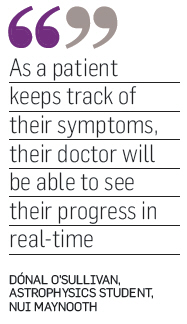NUI Maynooth students Dónal O'Sullivan, Marie Farrell and Cosmin Siclovan
The focus on young entrepreneurship seems to be becoming all the rage now, with young people all over Ireland starting to get in on the start-up vibe.
For instance, we have kids as young as nine who are starting to learn how to code via the CoderDojos. And this year, 550 projects made it to the finals of the BT Young Scientist and Technology Exhibition. The overall winners were Dublin students Eric Doyle and Mark Kelly, who developed an algorithm to help satellites and probes stay on the right flight path when in space.
Then we had the FIRST LEGO League Challenge back in January when a Galway team, whose members ranged in age from nine to 14, scooped the overall prize for its smartphone app that focused on food safety.
And, as for the area of cloud computing, Microsoft is aiming to get young people thinking about how they can come up with their own cloud innovations via its global Imagine Cup student technology competitions.
Just last week, a trio of students from NUI Maynooth won the overall Irish finals of the 2012 Microsoft Imagine Cup. The three students won for their cloud-based doctor patient system that’s aiming to make it easier for doctors to monitor patient conditions in real-time.
The NUI Maynooth students are Marie Farrell, who is studying computer science and maths at the university; Cosmin Siclovan, a computer science and software engineering student; and Dónal O’Sullivan, who is studying astrophysics.
The trio managed to edge past more than 600 other students to win in the finals. They will now be heading to compete at the global Imagine Cup finals this July in Sydney, Australia.
The idea for docTek Systems

According to O’Sullivan, the idea for the cloud-based system, incidentally called docTek Systems, was first spawned last year.
“The original idea came about when Marie was diagnosed with multiple sclerosis (MS) last summer. We wanted to fuse technology with medicine,” he explains.
He said the aim of the app will be to help people record their symptoms in real-time, but he is keen to stress that the app is not a diagnostic tool.
“We’ve started off with a prototype system for MS, but we see the scope to branch out from this framework for the long-term monitoring of other diseases, such as diabetes, epilepsy and asthma.”
O’Sullivan says NUI Maynooth has given the team members an internship so they can work on their technology in its computer science department once they finish their college exams. This is to allow the trio to fine-tune their product and carry out more market research before the global finals in July.
“We want to come up with an end product before the finals of the Microsoft Imagine Cup. We’ll be basing the app around what doctors and what patients want. We’re just the coders, the programmers and the developers,” he adds.
O’Sullivan says that when the product becomes available it will work on the Windows Platform, as well as Azure, and will be free for patients.
“As a patient keeps track of their symptoms, their doctor will be able to see their progress in real-time,” he explains, noting that the mentoring from Microsoft has been invaluable.
And what about the Irish team from IT Sligo that won in the global finals of the Microsoft Imagine Cup in 2011? The group, known as ‘Team Hermes’, won in the software design category at the time. Students Matthew Padden, Calum Cawley, Aíne Conaghan and James McNamara won for their software to help prevent vehicle crashes.
One more start-up: Clevermiles
Two of the students – McNamara and Cawley – decided to take the technology one step further by co-founding a new venture called Clevermiles, along with McNamara’s brother Chris.
Chloe McGuckin has since also come on board. The Clevermiles team members (minus Cawley who is still studying at IT Sligo) are now engaged in the Startupbootcamp accelerator in Dublin, and are hoping to commercialise their technology in the near future.
So what’s the road-safety tech all about? James McNamara says the system will aim to enhance road safety and save lives via a three-part strategy of driver monitoring, education and incentivisation.
Clevermiles is also pioneering a small hardware device.
“This device plugs into your car and can analyse a driver’s behaviour, giving them real-time feedback as they drive.”
McNamara says people will be able to plug into the device, generally below the steering wheel.
The device will extract all of the data from a car, including its g-force, and store it in the cloud.
The team has created both a mobile app and a website to complement the device.
“The online platform lets users communicate with their friends and social media streams. It also aims to educate them on how to drive more safely and will reward them for doing so with prizes.”
McNamara says parents will also be able to monitor their teens’ driving behaviour via the Clevermiles website or mobile app.
“We wanted to add a gamification element, with micro-rewards and monthly epic rewards for good driver behaviour,” he says. And drivers will apparently be able to review their driving history as well as monitor their scores.
“We are taking a practical approach, using game dynamics to incentivise continuous improvement in driving behaviour.”
The Clevermiles team has also found a supplier for its technology, so the aim is to go to market in the near future.
“The discussions with the supplier are still ongoing. We had initially planned to manufacture the devices ourselves but we put the focus on getting an MVP out in the market as soon as possible. Buying in hardware allows us to do this. We plan to soft launch the product towards the end of this summer,” adds McNamara.